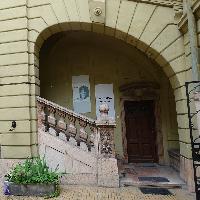Sovietinės valdžios išsiųstas į gilią Lietuvos provinciją Paberžėje 1966 metais, katalikų kunigas ir vienuolis Tėvas Stanislovas šią vietą pavertė inteligentijos ir visuomenės traukos centru. Tėvas Stanislovas tapo plačiai žinomas dėl savo pamokslų ir įvairių iniciatyvų, įtraukiančių žmones, kaip kolekcionavimas, senų daiktų taisymas ir restauravimas. Kolekcijos medžiaga atspindi aplinką, kurioje Tėvas Stanislovas skleidė savas politines, religines ir socialines idėjas.
-
Vieta:
-
Temos:
-
Įkūrimo data:
-
Charakteringi eksponatai:
An archive of several tens of thousands of photographs representing the life’s work of one of the most acclaimed Polish photographers – Tadeusz Rolke. It comprises photoreports on the everyday and cultural life in Warsaw, fashion photography and documentation of avant-garde events from the mid-1950s until 1970, as well as photos depicting Polish society during the “carnival” of “Solidarity” in 1980, during the martial law, the transformation in 1989, and the alternative culture of the 1980s.
-
Vieta:
-
Warszawa Pańska 3, Poland
-
Temos:
-
Įkūrimo data:
-
Charakteringi eksponatai:
The private collection of Tamás Csapody (1960–) includes documents related to movements for the reform of the compulsory military service and the introduction of alternative civilian service. Refusal to perform military service was an illegal act in the countries of the Warsaw Pact. Csapody’s collection, as the only collection focusing this specific topic, contributes to remembering the stories of people who were penalized by the laws of the Kádár regime because of freedom of thought, conscience, and religion.
-
Vieta:
-
Temos:
-
Įkūrimo data:
-
Charakteringi eksponatai:
The Tamás Cseh Archive is an interdisciplinary collection focusing on the materials related to the life and oeuvre of the legendary singer. His songs authenthically capture the atmosphere of the era, the feelings, moods and problems faced by the members of a generation that came of age in the 1960s and early 1970s and had to confront the complexities of integrating into socialist society. The goal of the archive is to present its materials in context, adding to the documents with oral history recordings of Cseh‘s contemporaries.
-
Vieta:
-
Budapest Úri utca 54, Hungary 1014
-
Temos:
-
Įkūrimo data:
-
Charakteringi eksponatai:
Tamás Szőnyei worked as a music journalist in Budapest in the 1980s, and his poster collection documenting the underground music scene, especially new wave and punk, is one of the largest in Hungary. Posters were designed in a large part by the contemporary artists playing in the bands. This is a private collection that was digitized by Artpool Art Research Center, and the originals are regularly borrowed for thematic exhibitions in Hungary and elsewhere.
-
Vieta:
-
Temos:
-
Įkūrimo data:
-
Charakteringi eksponatai:




